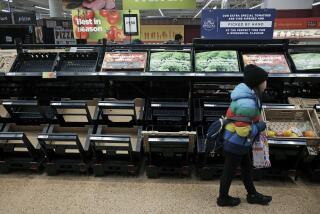Scary Days for Freer Trade
- Share via
Public fright over “mad cow” disease in Britain helped bring down the Conservative government two years ago; chicken, other meats and eggs contaminated with cancer-causing dioxin helped topple the government in Belgium just last weekend, and food scares of one kind or another have shaken faith in food regulators across Europe. The next victim might well be planned liberalization of international agricultural trade rules, including for genetically altered food crops.
While most of the recent food scares in Europe were local, there were international flaps this month over one of the most famous U.S. products, Coca-Cola. Hundreds fell ill because a bad batch of carbon dioxide gas apparently was injected into Coke at a Belgian bottling plant and because soft drink cans reportedly out of Dunkirk, France, were contaminated with fungicide sprayed on wooden shipping pallets. The alarm spread beyond Belgium and France to Luxembourg, the Netherlands and Northern Europe, and bans on Coca-Cola products were reported as far away as Saudi Arabia.
Each of the scares has jolted public faith in government food regulators, and with each incident concerns over food safety rise. European consumers’ deep suspicion of hormone-treated cattle starting in the 1980s led to a ban on U.S. meat imports and triggered a decade-long trade war. U.S.-grown genetically modified corn and soybeans have more recently been subjected to labeling in the European Union, and, despite opposition from the United States, more labeling rules are being drawn up.
Science has found little wrong with genetically altered produce, but in Germany and Britain it is seen as “Frankenstein food.” A recent poll found that only one in 100 Britons believes genetically altered food is safe. Some British food retailers refuse to carry such products, and Prince Charles joined the crusade against what he calls an “Orwellian future.”
Caution is commendable when it comes to food, but regulation based on consumer panic would undermine World Trade Organization agreements accepting science as the determining factor in food safety, stir nationalist sentiment and play into the hands of trade protectionists. That is particularly worrisome for U.S. farmers, whose exports exceed $50 billion a year. And it does not bode well for the next round of WTO trade talks, scheduled to open later this year in Seattle. Those discussions will be aimed in large part at opening agricultural markets.
More to Read
Sign up for Essential California
The most important California stories and recommendations in your inbox every morning.
You may occasionally receive promotional content from the Los Angeles Times.













